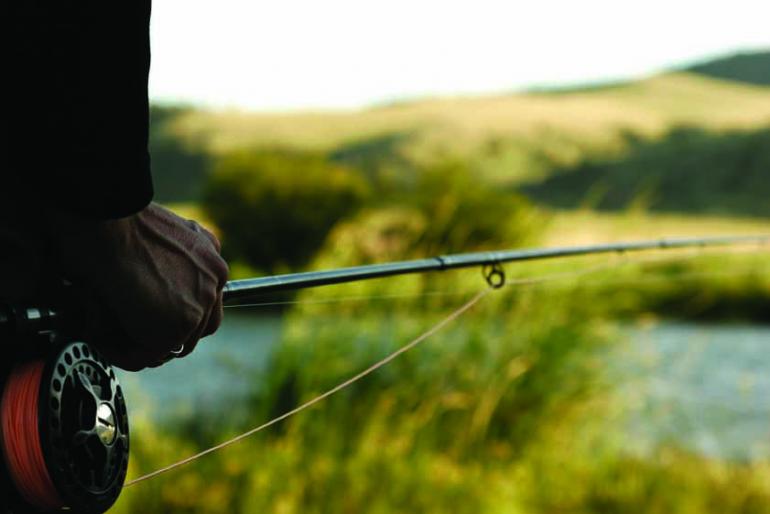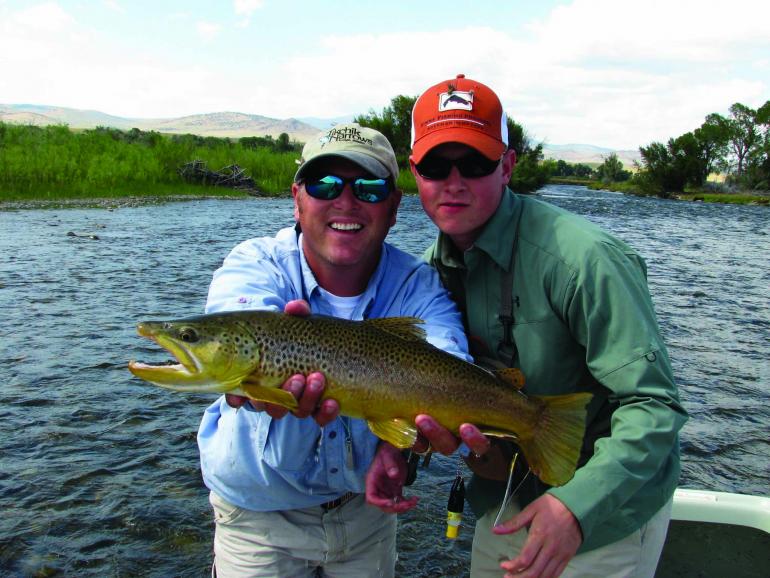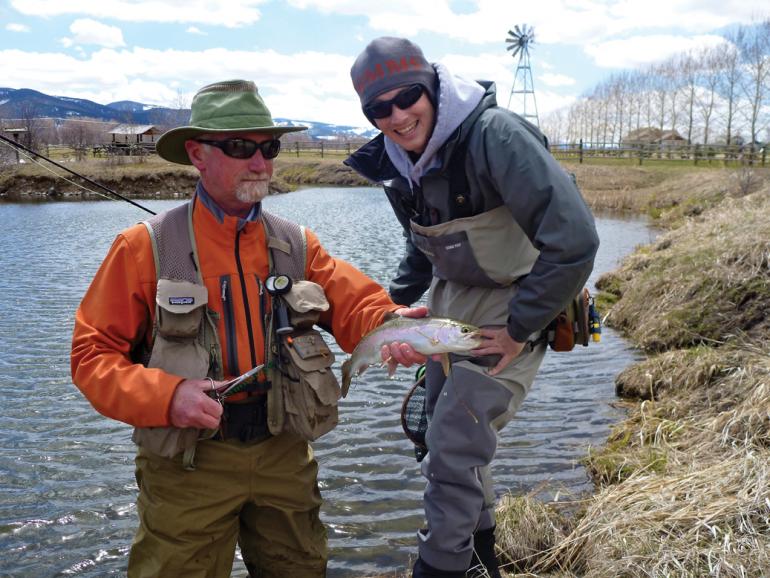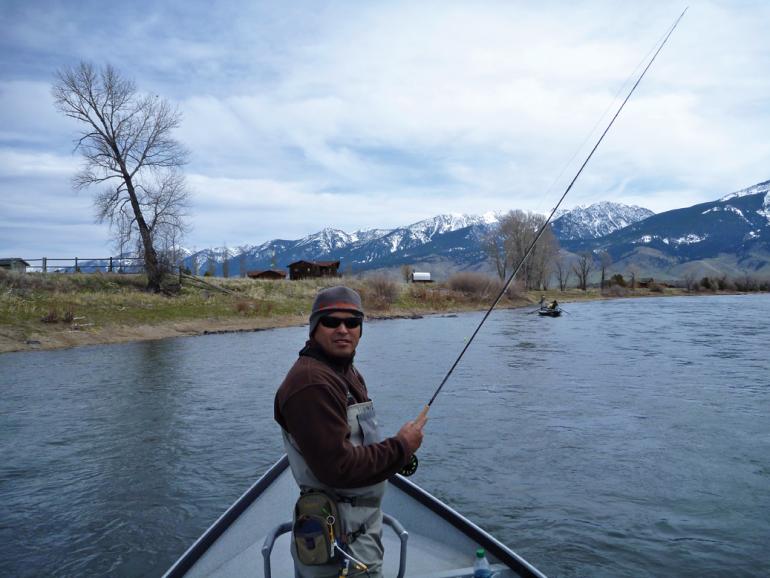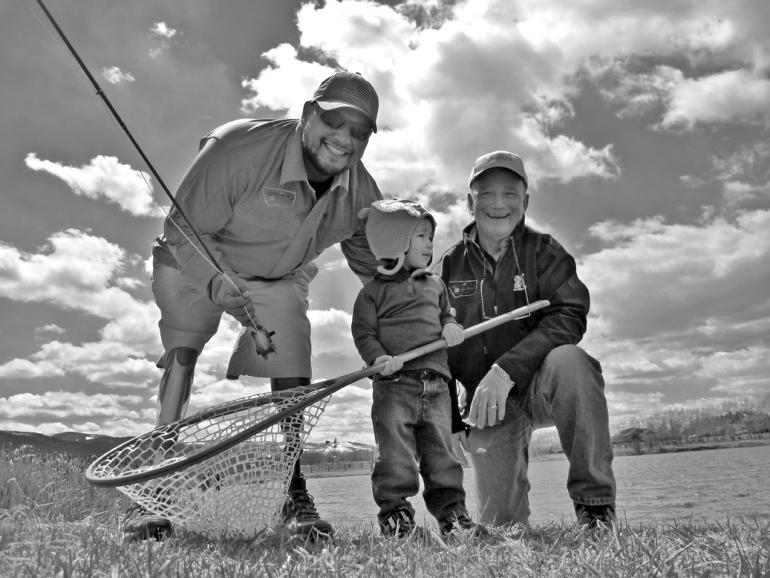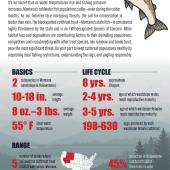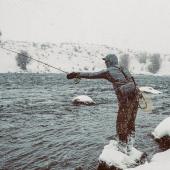Semper Fly
Spend enough time on the water and you will meet all kinds of fishermen who are dropouts and ne’er-do-wells, men bent on cheating time and ducking out of the world. But you will meet very few hopeless fishermen. For fishing forces optimism even into the soul-sick and the beaten. As the Scottish novelist John Buchan said, “The charm of fishing is that it is the pursuit of what is elusive but attainable, a perpetual series of occasions for hope.”
And so it is with Warriors and Quiet Waters, a Bozeman-based outfit of hope merchants led by retired Marine colonel Eric Hastings. Since 2007, cofounder Hastings and his merry band of 276 guides, drivers, cooks, board members, and volunteers—nobody is paid, including him—carry out a mission that is simply stated: “to employ the therapeutic and rehabilitative qualities of fly fishing for trout on Montana’s rivers and streams to help heal traumatically wounded U.S. servicemen and women.” Hastings elaborates: “I know what it’s like to be in combat, and I also know that semper fi—always faithful—is more than just a slick motto. You can’t just walk off into the sunset. This is an honor contract between Americans and the people who were sent to war in their name. It’s about serving your fellow warriors.”
And serve they do. Relying on mostly modest donations from individuals, seven times a year Warriors and Quiet Waters (WQW) flies out a group of a half-dozen wounded soldiers and sailors from their hospital wards and rehabilitation programs for a weeklong stay in southwest Montana. These are warriors fresh off the battlefields of Afghanistan and Iraq. They’ve been shot up, blown up, and every other up that man has designed to obliterate his enemy. Some arrive missing limbs and eyes and chunks of skull. All arrive missing other things they can’t quite articulate—the result of either Post-Traumatic Stress Disorder (PTSD), Traumatic Brain Injuries (TBI), or both.
They are housed at the 356 Ranch, a spacious log home on 20 private acres, with every amenity from a sauna to a stocked trout pond to a postcard view of the Bridgers. They are looked after by “house moms.” One mom, Celia O’Connor (along with her husband, Tom, a retired Navy officer), stays on the grounds in a pickup camper, where she wakes before dawn to cook meals for the visitors. The warriors are kitted up with thousands of dollars worth of five-weight fly rods and top-of-the-line Simms waders and fishing gear (which—unusual in similar programs—they get to keep). They are taken fishing everywhere from farm ponds to spring creeks to big rivers like the Yellowstone and Madison. Mostly learning by doing, they are instructed on everything from casting to mending line to fly tying on pricey Regal vises, which they also take home.
They are given choice fly-tying materials hand-selected for them by legendary local fly tier Willy Self, a grizzled Marine veteran who mans the counter at Montana Troutfitters, which doubles as WQW’s staging area for fishing outings. Famous for flies like his Wiggle Damsel and Fruit Roll-Up, Willy tells new recruits not to pick squirrel fur off the asphalt to make roadkill flies or you’ll end up with carpet beetles eating through your stock. They listen. As Willy convincingly tells it, “I do three things in my life—I fly fish, I row a boat, and I tie bugs. If it’s anything else, I’m not interested.”
If anybody rivals Willy in believing in the sacrosanctity of fishing, it is Hastings. A retired Marine fighter pilot, the 68-year-old is basically the Great Santini, Big Sky edition. He snaps out commands in a bark-ish rasp. Ever the organized officer, he hands volunteers thick three-ring binders full of contact numbers, hour-by-hour schedules for the coming week, and aerial maps of the “F/X’s”—in military parlance, that’s short for Field Exercise, but for WQW it’s “fishing experience.” Then he warns, “The plan always changes when I have contact with the enemy.”
Hastings is a man of surprises. Retiring after three decades in the Marine Corps, he decided to study classical piano, getting his master’s degree from Mannes at the age of 56, among the oldest graduates in the conservatory’s history. He still wakes up around 5am to play for several hours, though he adds, “Being a good Marine, I don’t play the piano, I assault it.”
But Hastings is also uniquely qualified to run this wounded warriors operation. An A-4 pilot, he flew 168 missions in Vietnam under the call sign “Sinus,” an unfortunate nickname he earned for his legendary nasal blockages. “I was renowned for passing out at 30,000 feet,” he says, still wincing at the label. “Sometimes for seconds, sometimes minutes. One time I woke up at 6,000 feet. It was kind of dangerous. I was hoping for anything else—Tiger, Shark, Evil One. So what do I get tagged with? Sinus.”
In all his sorties, he never lost a plane. Though he did lose other things, he makes clear, pointing to a photo in the memorabilia room of his basement of two swaggering fighter jocks standing beside each other in G-suits. One of them is a much younger Hastings. The other, he says, “was killed—he was my best friend.”
Hastings didn’t have much say in becoming a fly fisherman. Not only is he a native Montanan, but his dad was the state entomologist and a deadly dry-fly assassin. “He tied his own flies, he knew his bugs backwards and forwards,” says Hastings. “I can categorically assert that my father was the best fly fisherman in Montana. Even when there was no hatch, he would coax fish to rise from the depths.”
As a young boy in the days before felt soles, Hastings and his father stuck carpet swatches to the bottom of their boots with Barge Cement to grip the eel-slick rocks of the Gallatin, where a misstep in a fast run can send you on a very long swim. He started fishing at eight years old, but put it away as a teenager after discovering beer and girls. Upon going active duty in the Marines, he returned to fly fishing in earnest. Even while on deployments, “I had to get back to Montana to fish.”
In some ways, fishing saved him. Hastings is a professed alcoholic—“haven’t had a drink since 1975,” he crows. After Vietnam, he says, taking a pregnant pause, “Some aspects of this story I don’t really want to talk about… Let’s just say I knew I needed to get away to a peaceful place. I got out on the river, and that brought the peace almost immediately.”
Having moved 28 times in a 30-year Marine career, the Hastings family is still about as committed to the military as one can be. Both adult sons are Marine officers—having pulled deployments in Afghanistan and Iraq, leaving no rest for Eric’s war-weary wife, Jean, who says, “If you send your husband, you can always get another husband. If you send your son, you don’t get another son.” But several years back, when the couple went on a fishing trip together in Canada for “prairie sharks” (northern pike), Hastings’s wheels started turning as to how he could bring wounded warriors to Montana to find the peace he found through fishing.
Hastings joined forces with a local retired doctor named Volney Steele, who was having similar thoughts. Their organization was born along the lines of the well-established Project Healing Waters, which was started in 2005 at Walter Reed and now has about 80 chapters throughout the country. But Warriors and Quiet Waters tends to be more intensive, plus they outfit the servicemen, presumably affording a better chance to keep them fishing for life. And in no way does the organization play politics—to them, how they feel about our wars is beside the point. Warriors don’t get to choose which wars they fight. They just have to fight them.
WQW is also nonreligious, but the name came to Hastings at his Methodist church, where he noticed water motifs everywhere—such as on the banner containing a New American Standard translation of the 23rd Psalm: “He leads me beside quiet waters. He restores my soul.” Hastings recites the opening line of Norman Maclean’s A River Runs Through It, one every fly fisherman knows: “In our family, there was no clear line between religion and fly fishing.”
“Well, I believe that,” says Hastings. “That’s true for me. Always has been. The two interweave and cross over.” So when his pastor preached a sermon on water, the name “Warriors and Quiet Waters” was clinched. He can still recall his pastor’s words: “The thing about a river is, it is never the same. It is constantly changing. It’s changing as we speak. The water is passage. It’s like time. Those molecules are downstream, they’re gone—they can’t be regained in any way.” It struck a chord in him, Hastings says, “that you can’t regain what is lost, and that you can’t expect to…”
He trails off, then quickly turns back into the salty Marine. “Well I don’t know... that’s bullshit,” he growls. “So the point is, there’s all these quotes about water.”
The group’s fly fishing director, Collin Brown, is a rangy, dark-humored high-school teacher, fishing guide, and fourth-generation Montanan, owner of Montana’s Last Best Outfitters. “I was born with a shotgun in one hand and a fly rod in the other,” Collin explains. This comes in handy for the “cast-and-blast” floats he does with clients, in which they carefully catch and release beautiful trout, before turning around and pegging ducks out of the sky from his drift boat.
Recalling past fishing operations, Hastings and Brown say the rhythm rarely varies. Servicemen arrive on the first day tight and tepid and often distrustful. Some don’t talk or smile. Most have never fished at all, let alone fly fished. By the third day or so, they’ve been bombarded by loving instruction (even though Collin, who has a special touch with the most introverted warriors, playfully mocks them as nancies after suspect casts). They’ve been overwhelmed by Montana’s storybook scenery and by kindness from the volunteers. They begin understanding that they’re receiving a gift, in being taught to fish, that they can keep reopening for the rest of their lives. So their shoulders start relaxing and their countenances lift. Many who are plagued by insomnia and night terrors start sleeping again.
While some are initially gung-ho about racking up big numbers on the water, often they learn as the week goes on that the best part of fishing is sometimes only tangentially related to actually catching fish. Floating a river like the Yellowstone, says Collin, “I’ve watched more warriors by that third day catch one fish, then reel up, sit in the boat, and just watch.”
Many volunteers with WQW say that doctors and physical therapists have told them they saw more improvement in patients after one of these six-day fishing trips than they had in six months of conventional therapy and rehab. And WQW hosts some very hard cases, as is evident from Hastings’s and Brown’s war stories.
There’s Navy SEAL Elliot Miller, a leg amputee who had lost so much blood he had nerve injury and brain damage, could barely move his hands, and had to grunt to communicate. When he arrived, he couldn’t put sugar in a cup of coffee. But during a fly-tying lesson from which he felt excluded, he bumped Hastings in the back of the knees in his wheelchair to gain access to the table. Then, under the patient tutelage of their fly-tying instructor, he tied a Woolly Bugger. It took him 45 minutes to complete one, but his doctors back home were dumbfounded.
There was Army sergeant Erin Schaefer, a double below-knee amputee. After a satisfying day of fishing, Schaefer walked up 13 log steps to his room in his prosthetics, removed them, then hobbled back down on his butt and hands. Though dabbing his still-weeping stumps with cloth, says Hastings, he arrived at the “dinner table with a happy smile on his sun-reddened face.” And there was Marine captain Blake Smith, a wheelchair-confined leg amputee with significant nerve damage. Despite his demeaning personal care issues in close quarters, Hastings recalls watching “him blossom after days of instruction and fishing, and holding and crying with him in my own anger and sadness, yet buoyed by his strength in the face of unfairness and PTSD.”
On a lighter note, Collin fished with Adam Kisielewski, a Marine who’d lost an arm and leg after an IED blast. Adam established an all-time record for the program, while learning to strip line with his teeth and wrap it around his stump. He caught 100 fish in three days. So frantic were he and Collin to hit 100 (Adam caught 60-plus trout on hoppers on Sixteen Mile Creek) that it got to the point, says Collin, “that he would jump on my back and I’d carry him to the next run. It was hilarious. A hundred fish! What the hell? Did we just do that? As we were driving home, he told me he had sand in his foot. Usually you pull off a boot. He pulled off his foot. I have a picture of us going 70 down a dirt road to get back for the farewell dinner. We’re hauling ass, and he’s emptying his actual foot of sand.”
Perhaps most impressive was Marine corporal Matt Bradford, a double amputee, one leg above the knee, the other below, with a shrapnel-injured right hand, TBI, and PTSD. Additionally, he’s blind. That didn’t stop him from learning how to catch fish on a dry fly. Being a good Marine, like so many of these new fishing recruits, he was a fast learner and knew how to follow orders. A spotter guide would use the clock code, and Bradford learned how to throw 20 meters of line at the 2:00 position. The guide would tell him to mend line, let it drift, stand by, and then when the fish would rise, he’d yell “strike.” The first time, Bradford set the fish so hard he yanked it out of the water, clean over his shoulder. But he settled down, and caught fish after fish. “How perfect is that?” asks Hastings. “There’s a blind guy with a rainbow or brown ripping all over the river.”
At the airport, a group of volunteers turn out to receive the latest batch of wounded warriors—this time six Marines who’ve flown in on a C-12 turboprop from Air Station Miramar in California. As they deplane, creaky from their neck and back issues, it’s obvious that they’ve all been shot or blown up or both. Although nobody’s missing a limb, all have Purple Hearts. Except for one who periodically uses a cane, they all walk on their own steam and carry their own bags. But sometimes, the worst injuries are the ones you can’t see. These Marines, suffering from PTSD, aren’t as in the clear as they look.
The warriors are immediately caravanned to Simms, where they get suited up for the week ahead. Simms gives WQW all their normally pricey gear at cost (plus some freebie extras): boots, waders, wading staffs, chest-pouches, the works. “You guys got better shit than me,” grouses Collin, “and I do this for a living.”
The soldier with the cane is Joshua Kelly, a Marine whose commitment to the Corps is second only to his commitment to unfiltered Camels, so he heads outside for a smoke. Boyish, with a Wisconsin accent, Josh looks fresh out of a Norman Rockwell painting where the girls are pigtailed and the boys are freckled and everyone flirts harmlessly at the soda fountain. Hastings repeatedly razzes the 23-year-old, calling him “The Teenager.” “If it makes you feel younger,” Josh retaliates. Looks, however, can be deceiving.
Josh has packed a full life into his time on earth, and almost saw that time expire. The fix was in early on his becoming a Marine. His dad, whom he just recently met for the first time after getting injured, was a Marine. And his mother was a Marine drill instructor. While some kids grew up watching Sesame Street or Barney, Josh was raised watching Sands of Iwo Jima. A lance corporal with the 2/3 Weapons Company, Josh was an infantry assaultman and part-time tunnel rat because of his size. “My specialty is explosives and breaching and clearing stuff,” he says. Josh pulled tours in both Iraq and Afghanistan, only seven months apart.
In Iraq, he didn’t see much contact by the time things were trailing off in 2008. He was shot at twice, and his convoy hit three IEDs. “That’s a joke,” he says. But when he went to Afghanistan in 2009, it was a “whole ’nother world.” His squad alone got hit by 35 IEDs. He once saw 15 IEDs detonated in a single day. The law of averages finally caught up with him. When the blast exploded his Humvee, it came through the floorboard and broke Josh’s right foot, as a chunk of the engine landed on his left ankle. His feet were in the vehicle, his body thrown outside of it. His Oakley glasses were pushed into his face from the dashboard impact. When he took off his Kevlar, the Oakleys came with it, ripping his face into a gusher of blood and dirt. He was blind for the next 24 hours.
The docs told Josh he’d need both feet amputated. For a whole month, he thought he’d be a double amputee. “It doesn’t hit you too hard until you get home and see your family and have to tell them,” he says. Though he hastens to add he knows a lot of amputees from time logged in the Wounded Warrior Battalion. “They’re the greatest people,” he says. “They tend to be in a good mood. You’ve been there, and see that your life can end, so you take advantage of it from that point on.”
But after 15 surgeries, a doctor changed his mind, telling Josh he’d keep his feet, though he’d never walk again. He did just that eight months after he got hit. Then they said he’d need assisted walking for the rest of his life. Now, despite arthritis in his feet, Josh can mostly manage without a cane. So they’re telling him he’ll never run. But why start betting against himself? If he can’t run, he can’t get back into the fight. And he wants back into the fight, especially with the recent news of Bin Laden’s death, which he furtively admits, not wishing to offend the house moms, “gave me wood.”
After pizza at Simms, the caravan moves on to Cold Stone Creamery, and there’s dinner at the ranch still to come. The warriors joke that they’ll all need to go to a fat farm after their fishing trip. Gunnery sergeant Lawrence Salcido, the grand ol’ man of the group at 37, holds senior rank. The others lapse into calling him “Gunny,” though he blanches, insisting that they call him “Sal,” as nobody wears rank around here. (Hastings himself says, “I want them to focus on recovery, not on being nice to some old fuckin’ colonel.”)
Unlike Josh, Sal’s had it with the fight. He never considered himself a warmonger, “but if something needed to get done, it needed to get done.” Things changed for him “when I saw this girl I knew get blown up.” Or maybe it was picking up Marine remains off the side of the road. Or maybe the burned kids at Brook Army Medical. “I call them kids,” he says, reproaching himself. “It’s hard for me not to—they’re so young, 19, 20 years old. It’s like man, time to move on, I think.”
When his vehicle was hit by an IED in Afghanistan, Sal only had two weeks to go before coming home from his fifth combat deployment. His turret gunner got blown out of the vehicle. Both axles were gone. Sal broke his thoracic vertebrae #4 thru #8, and caught shrapnel in his thigh and the inside of his mouth. He fought for breath, and had an out-of-body experience, trying to get a message to his wife to tell his three daughters he loved them, to no avail. (An old combat buddy living stateside, he found out later, bolted upright in bed the moment he got hit, saying, “Something is wrong with Sal.”)
Before he was hit, Sal used to tell people that PTSD was a sham, something that afflicted a “weak-minded person.” Now he knows better, and has had to apologize to a lot of people. “I was wrong, because it’s there.”
His nights are no longer his own. He recently had a dream where he sees a man on the street pushing a woman, then beating her up. “Normally,” he says, “I’d go get the guy. But I was like, hey, it’s none of my business.” Then he saw the woman running off, the man pursuing her, and he heard her getting stabbed. And Sal, the man who once asked his Army Ranger father what service he should join that would push him the hardest (his father told him the Marines), the man who is not afraid of much, admits, “I’m afraid. I’m huddled down. I’m not doing anything. I woke up and am pissed off beyond belief for not having the courage to get up and go get that guy. I’m pacing back and forth. My wife says, ‘It was just a dream. You wouldn’t do that in real life. You would smack him around.’ ”
“It’s weird,” Sal says, over the happy clatter of customers getting served Cookie Mintsters and Mud Pie Mojos. “I don’t know what’s broken in me. I don’t know. I can only tell you my dreams.”
The next morning brings the first fishing day. Before hitting the water, the warriors get a casting lesson at the MSU Fieldhouse. Collin takes the reins, dryly informing them that this is his first time fly fishing, too. He asks how many have seen A River Runs Through It. Everyone has. “Good,” he says, “Forget everything you saw.”
That’s fine with Michael Grimmius, a 22-year-old who looks like a physical trainer. It’s what he intends to be when he gets out of the Marines, which can’t come soon enough for him, having not been able to live near his wife, who is stuck in medical school, for four years.
He’ll be one of the few physical trainers in the business missing part of his triceps, which he lost after someone threw a bag of grenades into an alley in Afghanistan (he also caught shrapnel in the throat). After hearing the bang, Mike took a knee and thought he’d gotten away clean. Then he felt wet and cold. “Looked down at my arm, and it was dripping blood,” Mike says. “That can’t be good.”
A natural athlete, Mike picks up fly casting quickly. Nearly all of the Marines do. Some pick it up so quickly that their guides move on to teaching them how to play fish by letting a volunteer companion pull on the line and run. Mike’s guide, Steve McGrath, gives him a wry grin. “With us as your guides, you won’t have to worry about hooking any fish,” he says.
WQW likes to ensure success on the first outing as a confidence builder, so they take warriors to promiscuity ponds, places where the fish are dumb and slutty, which this morning happens to be at a spring-fed farm pond called Ducky’s. Everyone puts on their waders and McGrath gets in his vest, which is covered in so much fish slime that it looks like it’s never been washed. He’s a fisherman; it happens.
Within ten minutes Mike hooks up and lands his first-ever rainbow trout, a glistening, wriggling 14-incher. Mike looks like a kid who just got a pony for Christmas.
Saul Martinez, a double amputee, joyously hobbles around in shorts, chasing his young toddler Ezekiel, his prosthetic metal legs catching glints of sunlight. Saul cycled through the program a few years back and liked it so much that after getting out of the Army, he moved to Bozeman and is now a student at MSU, as well as being WQW’s “wounded warrior adviser.”
Saul left his legs in Iraq in 2007. His thick forearms are tattooed testaments to the other things he left behind—memorials to all his buddies who didn’t make it out of the smoldering wreckage after the IED attack on their Hummer. He still remembers the smell—that of charred steak—every time he sprays PAM on the barbecue. He stayed in Montana, he says, partly because just look around, partly because of his time spent with the good folks of WQW. “The way they treated me here, it was almost like I was a normal guy,” says Saul. And he looks pretty normal too, except that his prosthetics can’t take the steep bank, which shifts him off-balance. So he sits on the ground, throwing high back-casts up into the sky, so as not to get hooked on the grass.
Whoever this Ducky is, his pond is a honey hole. Everywhere, warriors are pulling rainbows and browns and even the occasional brookie. No fish seems to be under 14 inches, and most are plenty bigger.
At the far end of the pond, Josh—who has more spinning rod experience than anyone here, catching bass and pike back home—calmly plays fish after fish without ever putting out his Camel. Someone asks him if his first fly rod–caught fish was better than sex. “Better than sex with a fish, yeah,” he says, beaming.
Standing nearby is Zachary Gillilan, a 21-year-old blond Californian, the wild man of the bunch. His forearm ink says it all: “Insane Infidel,” inscribed in Pashto, so the message wasn’t lost on the Afghans. “It was gonna say ‘Fuck Allah,’ ” Zach says. “But that’ll be my next one—figure I’ll get that on my left butt cheek.”
Diagnosed with TBI and PTSD, Zach practices what I can only describe as combat fishing. Though the fish presumably can’t hear him, he taunts them the entire time: Put it in your mouth you dirty whore… We’ll get these Taliban… Trying to hide on the bottom and shit, okay, where you at? It doesn’t stop him from tying into fish after fish. Of course, fly fishing isn’t often such an easy bounty, but the warriors are enjoying themselves so much that nobody has the heart to say it.
Zach has a fish on—his umpteenth rainbow. His guide, Jack Weiss, moves to net it, but the mulish fish won’t come in. Zach pulls up hard, and then harder still, until the fly slingshots from the trout’s lip and sticks solidly up Jack’s right nostril. Zach looks at Jack for a beat, then without expression, cups his hand around his mouth, yelling to the rest of the pond, “I gotta big one!”
Zach apologizes, offering, “When you’re out with Zach, things go whack,” by way of explanation. Jack looks peeved for a second, but then starts laughing maniacally, as Zach and his catch pose for pictures, with the nymph still up Jack’s nose and blood still dripping down his waders.
After the violence subsides, Zach offers up his life story. He too knew he was destined to be a Marine. When he was a toddler, his mother tells him, he used to crowd the television screen, gape-mouthed and mesmerized, telling everyone to shut up whenever “The Few, The Proud, The Marines” commercial came on.
A troubled kid from a broken home, he spent his childhood in a mad swirl of fistfights, run-ins with the law, car accidents, and the like. Most of these Marines are daredevils and adrenaline junkies—rock-climbers, ultimate fighters. Even the quiet one, Mike, enjoys spearfishing in shark-infested waters at night near his base in Hawaii.
But Zach is in another league, preferring illegal street racing—sometimes against highway patrolmen who don’t understand it’s a game. He once rolled his grandmother’s car 23 times and walked away. Another time, he and his buddy decided to jump his truck off a ramp, which would’ve flipped and crushed them were it not for the tow-rings catching the ground and righting the vehicle. They just laughed, drank some more tequila and Jäger, and drove off into the night. Zach failed to add yet another concussion to the 14 he’s had, only a fraction of which are combat-related. “I’ve lost a lot of brain cells,” Zach confesses. “Sometimes, I feel like a test-bunny for the Lord.” Zach’s currently in the Marines’ Wounded Warrior Battalion, but says he’s being processed out because, as he characterizes the doctor’s opinion, “I’ve been hit in the head too much and have gone retarded.”
Despite his early fascination, Zach almost went to jail instead of the Marines when he took the rap for a group of friends accused of breaking into someone’s house. He didn’t do it, he says. But he was a suspect. Once a promising football player who looked destined for a college scholarship, he had become by then a high-school dropout. He figured they had something to lose, he didn’t.
A Marine recruiter acquaintance of his knew he was innocent and went to bat with the judge, earning Zach a reprieve. “When he stood up for me like that,” Zach says, “I saw that sense of brotherhood come from nothing, and I wasn’t even a Marine yet. I could feel the brotherhood. I knew I was going to be a Marine no matter what. Nothing was going to change that.”
He ended up going to Helmand Province in Afghanistan. One day, at the end of a foot patrol, Zach and his best friend, Lance Corporal Richard Penny, were walking near each other. The men were a hundred yards from their base’s entry control point. They could see the flags. Zach looked at his buddy one last time, before the latter stepped on a pressure plate. Zach remembers the blast, but was knocked unconscious and thrown down a hill. “When I came to,” he says, “I looked up the hill to see what was going on. I saw my buddy in many pieces.”
Zach was flown to Germany, where he punched his doctor out, after phasing in and out of consciousness, then coming to and thinking he was still in Afghanistan. Aside from TBI, he has short-term memory loss and lost partial vision in his left eye. He fractured his L-5 disc, has nerve damage in his neck and lower back, and his ankle won’t turn correctly—the docs can’t even say what’s wrong with it. He was on bed rest for months, his equilibrium messed up. Every time he stood, he collapsed to the floor. He no longer has patience for little things, like standing in lines, or civilian complacency. They say Zach has severe PTSD, but he doesn’t think so.
“I mean sure,” Zach says, “I have flashbacks and nightmares. And almost every night I go to bed, I see his face. And I see him in pieces. I see the blood running down the hill. But to me, that’s not PTSD. It’s just my form of healing and punishment for what I did. It’s the Lord healing me in a very cruel and tough-loving way.” Zach insists it’s his fault that Penny, whom he commemorates in ink down one whole side of his arm, is dead.
Zach says he slacked off at the end of the patrol, that he was fiddling with his drop pouch, and drifted left. Penny, he says, being the Marine that he was, just covered his lane. When Zach talks about this episode over meals or on the water, Hastings and the fishing guides assure him that he cannot and should not blame himself for Penny’s death. But Zach won’t have it.
“Nothing’s gonna take him out of my head,” says Zach, matter of factly. “That’s okay. ’Cause I don’t want to forget. I always wanna remember that day, and the pain I felt. The remorse I felt. And the guilt I have inside of me. I learn from my mistakes. That’s what my mother taught me. It’s my fault that my best friend is dead. I got complacent. He corrected my movement and stepped on the bomb I was supposed to step on.”
Does Zach actually wish he had stepped on that bomb instead? “Yeah,” he says. “Every day. I wish every day that Penny was here and I wasn’t. Yes sir. He deserves to be in this life more than me. Not the other way around.”
A couple days later, guide Collin Brown climbs into his Xterra with “TRTBUM” license plates along with one of the wounded warriors, Staff Sergeant Richard Gonzalez. Josh and his guide, Al Gadoury, are in another vehicle, and are off to secret water: a spring creek–fed pond that overspills into the Gallatin near Big Sky. It’s a place that’s lousy with so many torpedoes—18- to 25-inch fish—that even Al, who is friends with the owner, is only allowed to fish it once a year.
Collin’s truck looks like the Fly-Fishing-Mobile. Not only are the dashboard and ceiling stuck with favorite retired flies such as the Sex Dungeon and Butt Monkey, but you have to crook your head to the side on account of all the fly rods he’s racked straight through the cabin. He used to break them down for his girlfriend’s sake, but finally figured she’d better get used to it. When clients ask him if he wants to marry someone who fishes, he tells them, “Fuck no! I want a girl who rows!”
In black wraparound shades, with all his tats, from “USMC” on his knuckles to “No Sacrifice” and “No Victory” on successive forearms, 29-year-old Richard Gonzalez looks like he could be a gang-banger. He fought professionally as a Mixed Martial Arts fighter (“I shadow cast,” injects Collin, “talk about tough”). And in Fallujah, where he was a corporal with the 3rd Battalion 1st Marines, he participated in Operation Phantom Fury in November 2004, the heaviest urban campaign U.S. Marines have been in since the Battle of Hue in Vietnam. There, he was known as the “Mad Bomber,” the kind of guy who’d put a satchel charge on an insurgent cadaver and blow a house into history. “I was pretty lethal,” says Richard, without braggadocio. “They’d get me a foothold, and I’d end the whole day for everybody.”
“Here, you’re the Mad Caster,” says Collin.
“I was hoping for Master Baiter,” says Richard.
“I’m going to open a fly shop called Master Bait and Tackle,” shoots back Collin.
“Tackle Master Baiters,” Richard improves.
They go on. Collin’s and Richard’s rapport is deep and immediate. But it doesn’t usually go that way for Richard. He has problems. Serious ones. Books—such as Bing West’s No True Glory—have been written about the battles Richard fought in. Securing Fallujah after it had been turned into an insurgent funhouse was the bloodiest work of the Iraq war—confusing and ferocious house-to-house combat. In one month alone—the month Richard was injured—70 Americans were killed and 609 wounded. “We were in the middle of a platoon-sized-element firefight,” says Richard. “I’ve never been in a scarier situation in my life.”
It started out a calm enough morning. Richard remembers eating blackberry jam on a cracker. But when word came that another unit was pinned down, his guys joined the fight. When they arrived, Richard says, “It felt like that street was a mile long. Not only were you fighting insurgents, but they had every street hooked up. They weren’t even hiding IEDs. Wired up right in the open. Bullets flying through the sides of Humvees. Shit’s hitting me in my face. I normally run around with 50 lbs. of C-4, a rocket, and all my gear too. I dropped it all, picked up magazines, loaded up, and me and my gunner, we just continued to fight. Run and gun.”
Richard was shot multiple times, catching a round in the Kevlar, one in his arm, and three in his back. He kept fighting. “We didn’t have a choice. There was nowhere to go,” he says. “There was no getting medevac’d. They were throwing grenades at their own guys trying to kill them so we couldn’t get intel.” Even after his injuries, he never left until his deployment ended, two months later. “My buddy got four Purple Hearts and a Navy Cross, and he never got sent home,” says Richard. So what’s a guy gotta do to get sent home these days? “Die,” Richard says.
Plenty did. Thirty-three of Richard’s friends, as a matter of fact. Since then, it’s been a rough ride. As a result of head injuries, Richard has memory loss to the point where he sometimes confuses the names of his four children. He gets disoriented. He held a lot of his PTSD in at work, before getting flagged, but “I was destroying shit at the house. I would throw computers through windows. Put my foot through a big-screen TV.” He and his wife, who stuck it out for a good while, got separated shortly before he came to Montana.
At the ranch that night, Richard stands alone on the porch, hunched over the railing contemplatively. Instead of sailing after his fishing bounty, he seems to be at the bottom of a hole again. Shockingly, he says that despite all his problems, he wants to get back to the fight. He’s seen what tyranny looks like and enjoys being part of the less than one percent of the world who can do something about it. But more important, he misses his brothers, and wants to fulfill his obligations to them.
Combat is hard, he says. It’s no joke, and no matter what you do, you can’t ever really prepare for it. “When it’s real, and your buddy slumps to the ground and you’re fighting next to your dead buddy, life really hits you in the face,” says Richard. “There’s no take-backs. There’s no reset buttons.” He assumes he made it out of the kill zone last time only because he was in a state of shock after being shot. He could feel two angels carry him to relative safety. He’s now afraid of a lot of things, but says he’s not afraid of death. “My obligation,” he says, “is to be there to risk my life, so that sometimes they don’t have to. And we’re all doing it for each other, where there’s so much sacrifice going on it doesn’t matter what you’re doing. Those are the kind of people I live my life with.”
This is the curse of PTSD, he says. You can fix an amputee by giving him a prosthetic leg. It’s trying and tough. He has to learn to walk again. But “how do you get 33 Marine deaths out of your mind, the way they died, and your wounds, and combat, and seeing things you don’t see every day? We try to do our best to hide that. With the loss of a limb, you don’t. You get help. But what about the guy who is hanging by a thread all day long? He feels ashamed to bring it up. People are going to say, that’s a wound? Like, is that really a wound? I live combat almost every day, because the same instincts that protected me are still more alive than ever. I can be in a grocery store and feel like I’m walking down the street in Fallujah... You fight yourself, with mind distortions, paranoia, hypervigilance, depression, guilt. It’s so complex. And it’s your mind, so you can’t ever escape it. I can’t ever put a prosthetic on that.”
All week long, it seems, the warriors seesaw. They get ruddy tans. They catch lots of trout. They find the peace that fishing affords—an absorption that transcends mere relaxation. And then, in off-moments, combat comes back to bite them, and the past seems to bleed into the present. On a non-fishing day bus tour of Yellowstone Park, many seem to pay only passing notice to sightings of “elk!” or “bison!” Instead, they call volunteers over to look at war porn photos on their smart phones, such as of the huge craters left by the IEDs that nearly killed them. They swap stories of near misses—Josh telling of tunnel rat misadventures and being forced to crawl over IEDs that didn’t explode. They clock significant anniversaries. Zach is particularly affected, as today marks exactly one year since his best friend stepped on a bomb.
In the most cavalier manner, they’ll fall into hair-raising tales. Josh tells of the time in Afghanistan that he convoyed past a man and his 11-year-old son. Shortly after they’d driven by, his unit heard a loud boom. They drove back to see what happened. The boy was standing over his dead father, bawling. “There wasn’t much of him left,” says Josh. “When we walked up, we just started laughing. I shouldn’t have. The kid was crying hysterically, but his father was trying to plant an IED for our return. His father had just been killed in front of him, and he was in pieces. Of all the things that affected me in Afghanistan, this one affects me most. But we were the ones he was trying to kill. Him, or us.”
On the last day, 28-year-old Eric Holkeboer fishes the Madison in a drift boat with his trout-bum guide, Jesse LeNeve. Jesse apologizes for his wreck of a truck, the hood of which is bungeed shut as the result of a deer that caved his headlight in. He eats the breakfast of champions—Fritos and Fig Newtons—generously asking if we want any.
The weather’s spotty, with occasional light drizzle, and water temps are cold. The riverside Buffaloberry has yet to even bloom. In this setting, Eric seems less like a Marine, more like the kind of fleece-covered Zen-master you’d meet at an REI climbing wall. He loves the outdoors, bouldering whenever he can. Even as a kid, he’d squirrel hunt and run around the woods in Michigan, fashioning zip-lines with his brother as they’d miscalculate tree-branch weights and angles, pancaking in the yard. He has a subtle, self-deprecating sense of humor, often punctuated by a tepid chuckle, one that’s not quite convinced of itself, as though he’s trying to laugh himself out of the unpleasant reality he’s just related. When asked what he’s doing since getting out of the Marines in January, he says, “Just growing a beard.”
Like the others, he has his Purple Heart story—a mortar attack on a roof in Iraq. He tried to pick up his fallen buddy, but his hand wouldn’t work, his tibia shattered, and he caught shrapnel throughout his arms and legs. They’re now healed—at least enough to fish. But like the others, he sometimes misses the very thing that injured him.
“Most people in combat kind of want to find that rush again,” Eric says. “Because when you come back, after the initial shock of a safe civilian life where you don’t have to worry about stuff on the road, everything just seems pretty boring. Waking up. Brushing your teeth. Eating breakfast. There’s no pandemonium. It’s harder to get excited about things.”
But Eric’s not interested in sharing war stories. He pretty much just wants to fly fish. Which he does rather well for having only tried it a few times in his life. Jesse shoves off and rows us downriver. Within several minutes, Eric ties into a rainbow, a spunky 12-incher that causes him to chuckle. When Jesse beaches the drift boat on a gravel bar, floating deep nymphs through a bucket that Jesse swears by, Eric scores another rainbow like an old pro.
By the time he picks up a whitefish, which most anglers have no use for, Eric chuckles, “Oh, I like whitefish—they fight harder than most trout.” With plenty of float left, Eric takes a seat, puts up his rod, and, as Collin predicted, just sits back and watches. He drinks in Montana and the Madison, looking something like content. He’ll probably try to re-up with the Marines, this time in some counterintelligence function. His test scores are pretty high. But for now he just wants to grab a bivy sack and camp out in places like this. People ask him what he wants to be when he grows up. Eric chuckles, then tells them, “I just want to be older, I guess.”
The farewell dinner that evening has a last-day-of-summer-camp feel. Everybody has the bronzed hue of time spent on the water. Stories from just three days ago are told as if they were ancient history. Nobody wants to leave, with Josh going so far as to suggest surrounding the airport with anti-aircraft guns to keep the plane from picking them up.
Colonel Hastings asks if anyone wants to say a few words. One by one, the grateful Marines get up to thank Warriors and Quiet Waters and say their piece. Zach Gillilan, who has horrified his dinner table all night with talk of rolling cars and other nine-lives experiences, is muted and humble, saying, “I’ll try to keep it short, I’m not much of a speaker, and I forget a lot of stuff.” Zach says that for the past year he hasn’t been able to sleep at all—“maybe 30, 40 minutes a night, off and on… And being here was the best time of my life. The first time I got into that bed, I slept like four hours... No mental health doctor, no doctor in the hospital, has helped me as much as you guys have helped me. I just want to say thank you from the bottom of my heart.”
Josh Kelly, leaning on his cane, his damaged feet aching from that afternoon’s wading, gets up and thunders, “I may look like I’m 12 years old. But I’ve been a lot of places in the world... I’ve been places where people have called me a baby killer. And I’ve been places where people have put me down... And there’s not many places in America where you’ll see the support that you guys are giving us… Excuse my language, but it just makes you fucking proud to be an American. And I absolutely love it. As soon as I get back, I’m looking for fucking land here... We’ve been through the darkest times of our lives in the recent past. There’s no sugar coatin’ it. We all went through shit, and seen shit, and that’s the way it goes. That’s our sacrifice to you. I love it. I love the fact that while you guys are sitting here at home, I was on the walls, guarding America. That makes me proud. And I can’t say enough, how much it affects my heart, that there’s actually still places in America where people truly do care.”
When Richard Gonzalez gets up, he warns that this “might be like a nosedive when I’m talking, because of my anxiety.” He says he could never call himself a fisherman, “because I don’t catch fish, and the ones I catch are illegal.” He admits he didn’t know what half of his gear was for, and “didn’t understand why we had to get such expensive gear to stand in water when I could just do that with what I’m wearing right now.”
But under Collin Brown’s care, he caught six fish his first day and nabbed 17 at the secret pond. Then he picked up 10 more that very afternoon at DePuy’s Spring Creek. He counted his fish up before dinner and realized they came to 33. Richard begins choking up: “The last time I ever experienced that number was my last deployment, where I lost 33 Marines. Ever since then, the number 33 has been ingrained in me. But today, I can say that that number, for the first time, is a positive.”
And so it goes, one grateful, gut-wrenching speech after another. When the party finally breaks up, the warriors linger, shake hands, and do what all fishermen do when they’ve been fishing together for a week: make more plans to fish.
This story is adapted from a longer piece published in the Weekly Standard.

